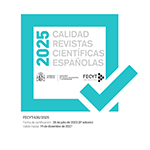El autómata versus el prójimo: Merleau-Ponty, crítico de Descartes
Abstract
With Cartesio appears the ontological rupture between the res cogitans and the res extensa, division that it goes accompanied by the dichotomy certainty – doubt. Applying this outline to the human being, we find a conscience separated from the world, a body-machine, a cogito and a body that aren’t intrinsically united. For that reason, the vision of a body is not to enter in contact with a conscience, which, ultimately, prevents to explain the other people's existence. Merleau-Ponty seeks to give solution to the problem of the alterity and, for that reason, he criticizes the Cartesian position. To give some few examples tried in this paper, Merleau-Ponty attacks the notion of conscience, the representation, the introspection, the reasoning for analogy…Downloads
Article download
License
In order to support the global exchange of knowledge, the journal Logos. Anales del Seminario de Metafísica is allowing unrestricted access to its content as from its publication in this electronic edition, and as such it is an open-access journal. The originals published in this journal are the property of the Complutense University of Madrid and any reproduction thereof in full or in part must cite the source. All content is distributed under a Creative Commons Attribution 4.0 use and distribution licence (CC BY 4.0). This circumstance must be expressly stated in these terms where necessary. You can view the summary and the complete legal text of the licence.











